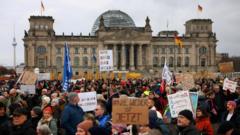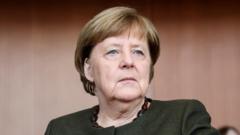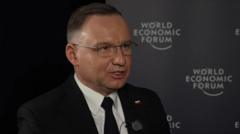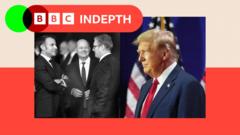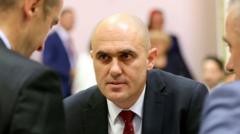In a pivotal moment for German politics, Chancellor Olaf Scholz has triggered the path to early elections after losing a parliamentary vote of confidence.
Confidence Crisis: German Chancellor Olaf Scholz's Revolutionizing Move

Confidence Crisis: German Chancellor Olaf Scholz's Revolutionizing Move
Chancellor Olaf Scholz Attempts to Reshape German Politics After No-Confidence Vote
In a dramatic turn of events within the German political landscape, Chancellor Olaf Scholz has experienced a significant defeat with a parliamentary no-confidence vote, initiating plans for early elections set for February 23. Bringing an end to a tumultuous chapter after the collapse of his three-party coalition government, Scholz anticipated this loss, believing that an early election might reinvigorate his party's political appeal.
"This will place the political direction of our country firmly in the hands of voters," Scholz remarked ahead of Monday’s vote, as he braced for the electoral battle to come. The vote's outcome saw 207 members of parliament (MPs) from the Social Democratic Party (SDP) cast their votes for him, while 394 opposed and 116 abstained. The implications of losing this vote mean that Germany could avoid prolonged instability, which is crucial given the prevailing economic challenges.
The decision comes two months after the disintegration of Scholz's coalition, leaving him leading a minority government dependent on opposition support for legislation. With an economy that faces stagnation and mounting pressures from global crises, continuing until the original election date of September 2025 was deemed imprudent.
Polls currently indicate significant challenges for Scholz's SDP, which has fallen behind the conservative Christian Democratic Union (CDU), led by Friedrich Merz, suggesting a precarious path ahead post-elections. While advocating for substantial investments—particularly in defense—in the buildup to the vote, Merz countered Scholz's proposals by emphasizing fiscal prudence and the need for tax cuts, especially concerning current debt burdens on younger generations.
Labeling the maneuver a "kamikaze" move, critics have denounced Scholz's strategy as potentially reckless, although it is recognized as a constitutional method for dissolving government under German law. The backdrop of the political turmoil stems from arguments over financial controls affecting the coalition's decisions, which ultimately courted destabilization.
The rise of the far-right Alternative for Germany (AfD) party, which has gained nearly 20% in recent polling, further complicates the dynamics within Germany’s political system. With the potential emergence of newer radical parties, a consensus-building approach to governance could prove increasingly elusive.
As the political arena shifts, with the possibility of the leftist Sahra Wagenknecht Alliance BSW also entering parliament, Scholz's future, along with the traditional political alliances in Germany, appears uncertain. Potential coalition partners for the CDU remain limited as they navigate the complexities posed by both far-right and far-left influences. Thus, a new phase in German politics predicated on instability and fragmentation is poised to unfold following the anticipated elections.
"This will place the political direction of our country firmly in the hands of voters," Scholz remarked ahead of Monday’s vote, as he braced for the electoral battle to come. The vote's outcome saw 207 members of parliament (MPs) from the Social Democratic Party (SDP) cast their votes for him, while 394 opposed and 116 abstained. The implications of losing this vote mean that Germany could avoid prolonged instability, which is crucial given the prevailing economic challenges.
The decision comes two months after the disintegration of Scholz's coalition, leaving him leading a minority government dependent on opposition support for legislation. With an economy that faces stagnation and mounting pressures from global crises, continuing until the original election date of September 2025 was deemed imprudent.
Polls currently indicate significant challenges for Scholz's SDP, which has fallen behind the conservative Christian Democratic Union (CDU), led by Friedrich Merz, suggesting a precarious path ahead post-elections. While advocating for substantial investments—particularly in defense—in the buildup to the vote, Merz countered Scholz's proposals by emphasizing fiscal prudence and the need for tax cuts, especially concerning current debt burdens on younger generations.
Labeling the maneuver a "kamikaze" move, critics have denounced Scholz's strategy as potentially reckless, although it is recognized as a constitutional method for dissolving government under German law. The backdrop of the political turmoil stems from arguments over financial controls affecting the coalition's decisions, which ultimately courted destabilization.
The rise of the far-right Alternative for Germany (AfD) party, which has gained nearly 20% in recent polling, further complicates the dynamics within Germany’s political system. With the potential emergence of newer radical parties, a consensus-building approach to governance could prove increasingly elusive.
As the political arena shifts, with the possibility of the leftist Sahra Wagenknecht Alliance BSW also entering parliament, Scholz's future, along with the traditional political alliances in Germany, appears uncertain. Potential coalition partners for the CDU remain limited as they navigate the complexities posed by both far-right and far-left influences. Thus, a new phase in German politics predicated on instability and fragmentation is poised to unfold following the anticipated elections.

